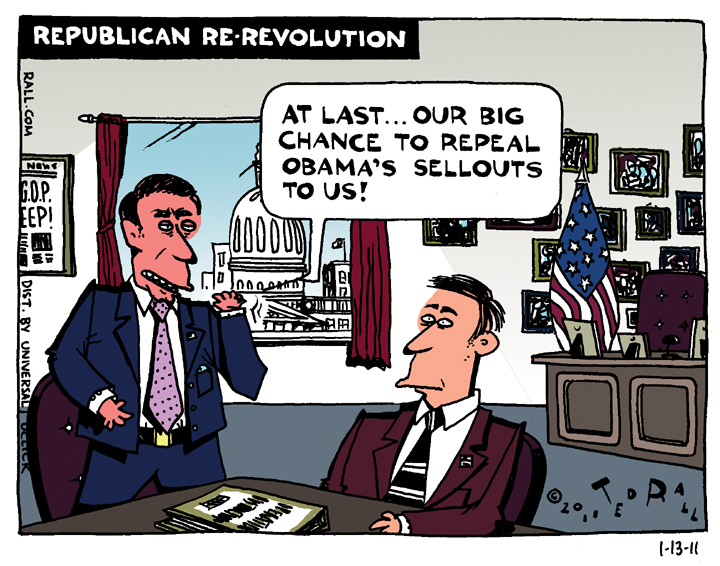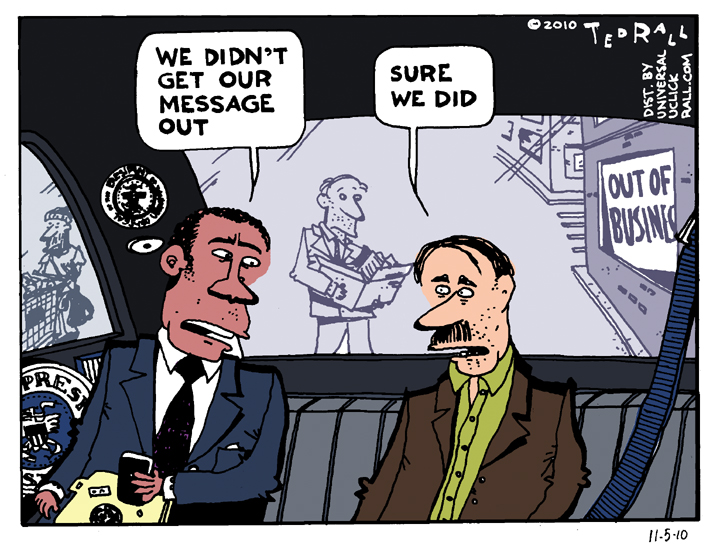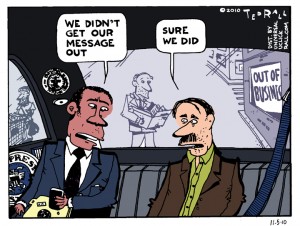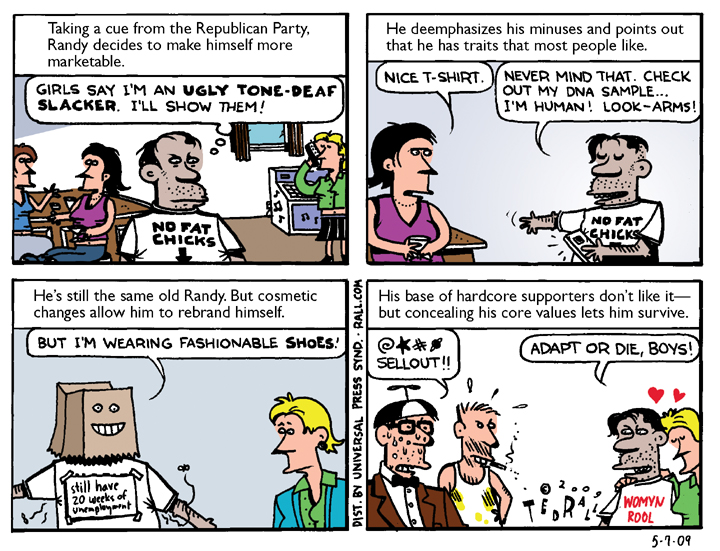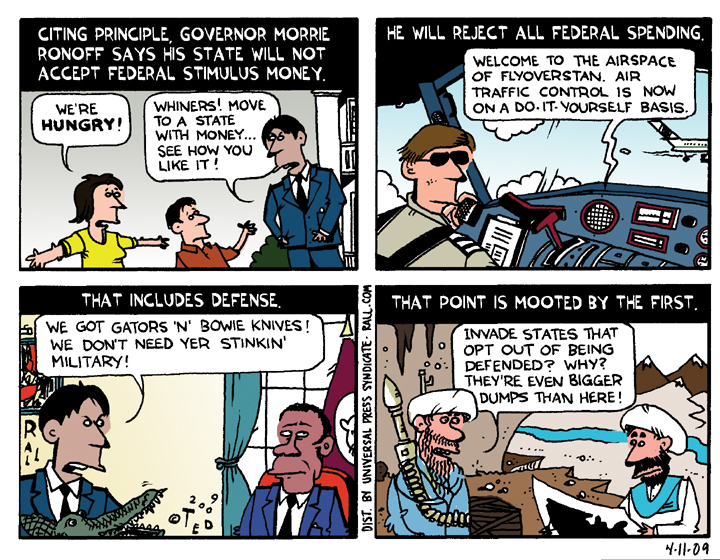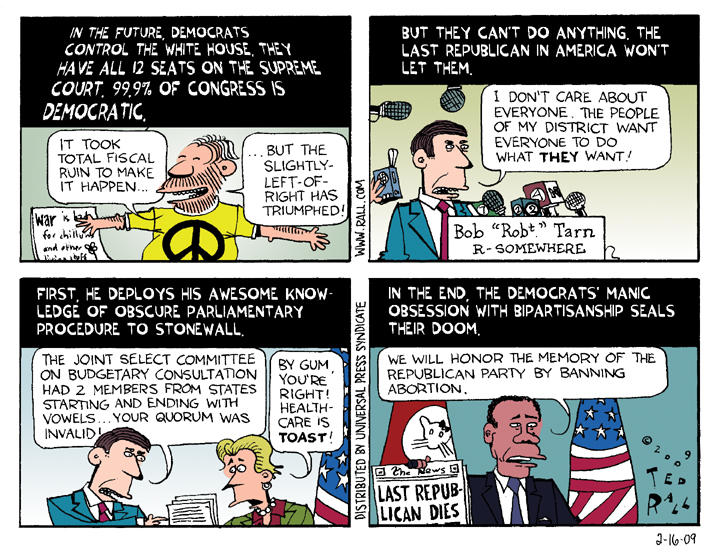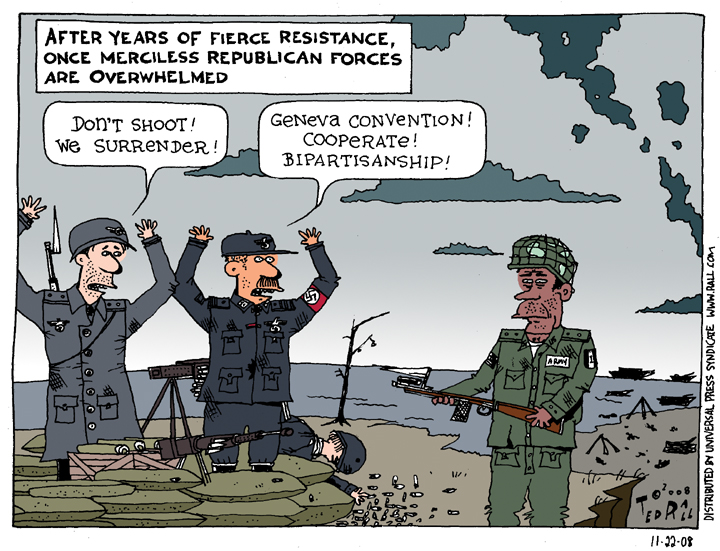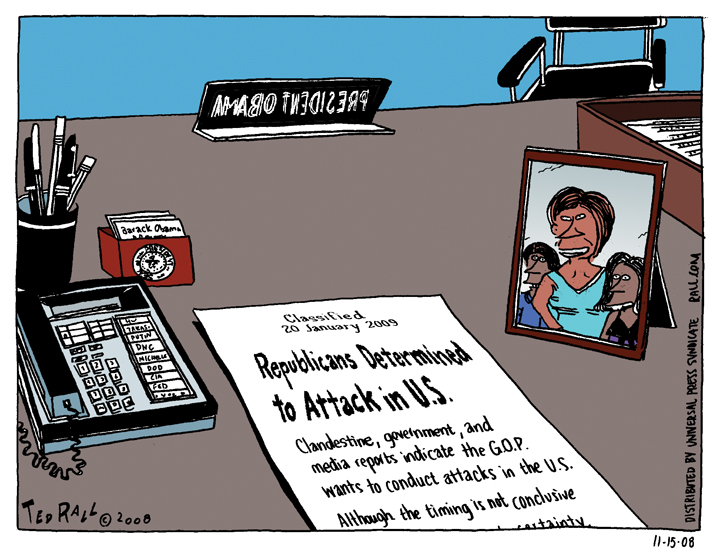Republican Congressmen pledge to reverse Obama’s policies. Why? His policies were pro-Republican.
SYNDICATED COLUMN: Yes, I Can
Straight Talk on Balancing the Budget
The federal budget deficit is like the weather. Everybody talks about it; except for Bill Clinton, no one ever does anything about it.
President Obama’s bipartisan Fiscal Debt Commission has released a draft report that starts out with a big problem: even talking about reducing spending is insane when you’re in the midst of a Depression. The real unemployment is over 20 percent. Creating jobs ought to be the feds’ top—perhaps sole—priority.
Let the insanity commence.
Triumphant Republicans say they want to balance the budget. So does Obama. Are they serious? Of course not.
Still, theoretical budget-balancing exercises help enlighten us about where our taxdollars really go. So let’s roll up our sleeves and start some back-of-the-envelope slashing.
The 2010 federal budget shows $3.6 trillion in spending and $2.4 trillion in revenues. Net deficit: $1.2 trillion. It’s a doozy, too. It nearly 13 percent of GDP. It’s the highest since 1943, during World War II.
The goal, then, is to close a $1.2 trillion budget gap. Can we find at least $1.2 trillion in budget cuts? News flash: getting rid of the National Endowment for the Arts ($161 million in 2010, or about 0.01 percent of the deficit), ain’t gonna do the trick.
Any serious budget cutter has to start with defense. The reason is simple: it accounts for 54 percent of discretionary (i.e., optional) federal spending. It’s the biggest piece of the pie by far.
(Mainstream news reports usually state that defense accounts for 20 percent of federal outlays. But they’re fudging the facts in order to pretty up the military-industrial complex. For example, they include budget items like Social Security that no one can do anything about—they’re in a trust fund.)
Of that 54 percent, 18 percent is debt service on old wars. There’s nothing we can do about that—though that number should probably give us pause the next time a president wants to invade Panama or Grenada.
Anyway, that leaves 36 percent, or $1.3 trillion to play with. $200 billion a year goes to Afghanistan and Iraq.
Let’s pull out. We’re losing anyway.
New Deficit: $1.0 trillion.
In 2007 Chalmers Johnson wrote a book about the staggering costs of American imperialism. “The worldwide total of U.S. military personnel in 2005, including those based domestically, was 1,840,062 supported by an additional 473,306 Defense Department civil service employees and 203,328 local hires,” he wrote. “Its overseas bases, according to the Pentagon, contained 32,327 barracks, hangars, hospitals, and other buildings, which it owns, and 16,527 more that it leased. The size of these holdings was recorded in the inventory as covering 687,347 acres overseas and 29,819,492 acres worldwide, making the Pentagon easily one of the world’s largest landlords.”
We’re broke. It’s time to bring those 2.3 million men and women home. At an average cost of $140,000 per employee—crazy but true—we could save $322 billion annually.
New Deficit: $676 billion.
After Defense, the other big costs are Social Security, Medicare and Medicaid.
The obvious place to start slashing is wealthy recipients. Why should Bill Gates, worth $58 billion, get Social Security or Medicare benefits? Dean Baker sums up the traditional liberal argument in favor of giving tax money to people who don’t need it: “Social Security enjoys enormous bipartisan support because all workers pay into it and expect to benefit from it in retirement. Taking away the benefits that better-off workers earned would undoubtedly undermine their support for the program. This could set up a situation in which the program could be more easily attacked in the future.”
Yeah, well, whatever. We. Are. Broke. “Means testing”—for example, eliminating benefits for the approximately one percent of families over age 65 who earn over $100,000 a year—could save $150 billion a year.
New deficit: $526 billion.
Now let’s talk about the other side of the equation: income. How can the U.S. government scare up some extra cash?
Allowing the Bush tax cuts for the richest three percent of Americans to expire on schedule would bring in $70 billion a year. Seems like a no-brainer: anyone earning over $250,000 a year is doing awesome. Moreover, if Democrats don’t insist on the expiration of at least some of those “temporary” tax cuts, what’s the point of the deal they cut with the GOP back in 2001?
New deficit: $456 billion.
When it comes to revenues, you have to go where the money is: the wealthy. The rich have gotten richer, which is a big part of the reason we’re in a Depression again. They’re hogging all the goodies. The rest of us can’t spend.
Despite the miserable economy, there are still 2 million American households earning a whopping $250,000 or more per year. (Their average income is $435,000.) If we were to increase these super-rich Americans’ marginal income tax rate from 35 to 50 percent—the same it was during the early 1980s under Reagan—we’d bring in an extra $131 billion a year. If we raised it back to 91 percent—the top rate during the boom years between 1950 to 1963—the Treasury would collect $487 billion.
Budget SURPLUS: $31 billion.
And we haven’t started on corporate taxes.
(Ted Rall is the author of “The Anti-American Manifesto.” His website is tedrall.com.)
COPYRIGHT 2010 TED RALL
SYNDICATED COLUMN: The Obama Postmortem
An Autopsy of a Political Suicide
It’s the day after the Republican sweep we all knew was coming. If Obama had any dignity, if he was honest with himself and with us, he would resign. It’s abundantly clear that he isn’t up to the job.
But you don’t become president by being honest or dignified. So now it’s wound-licking time. The President and his cronies are comforting each other. “It’s not your fault the economy sucks,” a Yes Man reassures Obama, sinking his heels into the new Oval Office carpet. “It was like that when we got here.”
Do they scratch him behind his ears? They should. It feels nice.
“It was the poor economy—not the wisdom of the Republicans’ ideas or the brilliance of their tactics—that assured they would retake control of the House,” coos MarketWatch’s Rex Nutting. Which is true. And doesn’t matter.
Democrats are taking solace in history. It’s the midterms! The party that holds the White House always loses seats in Congress. Look at Bill Clinton and Ronald Reagan. They suffered midterm defeats, then roared back to landslide reelection wins two years later. Not to worry! The voters will vote against the other party next time! Which is also true. And also doesn’t matter.
In the broken-down shambles of the excuse for a political system we have in the United States, there’s only one stage of grief: denial.
Barack Obama may well be reelected in 2012. Considering that the current GOP frontrunners are Sarah Palin and Mitt Romney, the odds favor him. But the Obama experiment is effectively dead. There will be no change, and so there is no hope.
Remember what happened to Clinton after the “Republican Revolution” sweep of 1994? He spent 1995 locked in a bizarre “co-presidency” with House Speaker Newt Gingrich before figuring out that his “partner” was more interested in obstructionist sabotage than bipartisanship.
Obama is heading down the same bloody path with John Boehner.
But Clinton did get that second term. During which he accomplished many things, such as…um…well, he did get impeached. Does that count?
I don’t understand why presidents want to get reelected. No president since FDR has gotten much done after his first term. Must be an ego thing. Either that, or it’s cool to have your own chef.
If Obama was going to shine, it was going to be during 2009. Elected by a sizable margin with an undeniable, media-backed mandate for change during a severe economic crisis he could exploit to push through his agenda, Obama also enjoyed the rare luxury of a Democratic House of Representatives and a nearly filibuster-proof Democratic Senate.
So what does he have to show for that marvelous gift? Three major items:
One: a healthcare overhaul that increases premiums and insurance company profits, and doesn’t include the public option he and everyone else said was absolutely essential. The good news is, the Republicans will probably repeal or defund this monster before it takes effect.
Two: a financial reform package no one knows about. Which is just as well, since it doesn’t crack down on the banksters.
Three: more dead Afghans.
They’re not much, but I hope Obama is proud of them. That’s as good as he’s going to get from now on.
What killed the Obama presidency? Political suicide. There were several death blows:
First and foremost, the economy. 60 percent of Democrats and 63 percent of Republicans told exit pollsters that the lack of jobs was their number-one issue. Obama never proposed a jobs program. He gave trillions of taxdollars to thieving banksters who ought to have been arrested instead, then tried to pass off this outrageous giveaway as economic stimulus. To make things worse, he stuck with an impossibly absurd argument: more people would have lost their jobs without it.
Even if the phony stimulus stopped things from getting worse—and it didn’t—people don’t care. They want the 20 percent of Americans who already lost their jobs—their friends, spouses, children and parents—to find new ones. Obama never addressed that.
He didn’t even try.
Second, he alienated his base. He didn’t even know who his base was.
Obama’s campaign was a potent mix of vague pabulum (“hope,” “change”) and, when he deigned to specify, center-right specifics (stop torture but expand the war against Afghanistan, bipartisan cooperation with the Republicans, no gay marriage, etc.). The problem was that the vagueness that helped him cobble together a winning coalition of leftist and independent voters made it impossible for him govern. Leftists got turned off when he doubled down in Afghanistan and refused to close Guantánamo; independents are notoriously fickle anyway.
If Obama’s advisors had been smart, they would have recognized two truths, one old and one new. The old truth is that the safest time to deliver to your base is the first year of a presidency; the passage of time allows the anger of the moderates to cool in time for the next election. The new truth for Obama was that his base comprised liberals who actually disagreed with much of what he stood for but had paid more attention to the “hope” and “change” posters than to his platform. He didn’t understand that.
Moreover, the world changed between September and November of 2008. Global capitalism collapsed. Millions of Americans lost their jobs and their homes during the next year. Wall Street, bankers, big business, the golden boys of the previous century, were discredited—but unpunished for their countless sins. By mid-2009 America had become a left-wing country, not in the media but among the citizenry, telling polls that their preferred economic system was socialism.
Team Obama didn’t understand that. They still don’t.
The inarticulate rage of the inchoate Tea Party caught the president by surprise. Neither Obama nor the political clones that form his center-right cabinet can see that in a binary political culture anger gravitates to the opposite pole. If Obama were Republican, the Tea Party would be identified with the left.
The takeaway is anger, not ideology. People are pissed. They hate the bailouts, but the bailouts aren’t the main point. More than anything else, the American people are angry that their government doesn’t even pretend to give a damn about them.
(Ted Rall is the author of “The Anti-American Manifesto.” His website is tedrall.com.)
COPYRIGHT 2010 TED RALL
SYNDICATED COLUMN: Republicans, Not Conservatives, Are In Trouble
A Philosophy Without a Party
* Conservatives betrayed by GOP
* Traditional conservatism still popular
* Rigid laissez faire dogma rejected by voters
Conservatives think the election results prove that conservatism is in trouble. Actually, conservatism is fine. It’s the Republican Party that’s in trouble.
To be sure, the GOP got killed in Congress. But the presidential results aren’t nearly as alarming. The difference between Bush’s “big win” in 2004 (51 percent of the popular vote) and McCain’s “stunning defeat” in 2008 (46 percent) was that 2.5 percent of the electorate changed their minds. Besides, it remains to be seen, says Montclair State University political science and law professor Brigid Harrison, whether the “high level of young voters, African-Americans, highly educated white voters and a disproportionate amount of women forming a new kind of coalition” will come together in future elections to support Democratic candidates more typical than Obama.
For the sake of argument, however, let’s posit that Obama represents a dramatic political realignment and repudiation of the Republican Party. Certainly, Republicans do face massive demographic challenges, mainly as an influx of Latino immigration and naturalization turns places like Arizona, Colorado and California’s Orange County from red to blue. The GOP may well have to get used to losing. But that doesn’t mean conservatives do.
In the United States, conservatism is a philosophy without a party. Take Ronald Reagan, considered the patron saint of late 20th century conservatism. Coupled with extravagant military spending, Reagan’s tax cuts for wealthy individuals and corporations increased the national debt from $700 billion to $3 trillion, transforming the U.S. into the world’s biggest debtor nation. Under Reagan, William Voegeli wrote in The Los Angeles Times in 2007, “government did nothing but expand. In 1981, the federal government spent $678 billion; in 1989 it spent $1.144 trillion. Factoring out inflation, that was an increase of 19% in real spending. Republicans never expected that Reagan would leave office with a ‘federal establishment’ one-fifth larger than when he arrived.”
George W. Bush campaigned as a “compassionate conservative,” but conservatism was as absent from his governance as compassion. He has increased the federal deficit from $3.3 to $5.9 trillion. Add in the wars in Afghanistan and Iraq—estimated at $2.4 trillion as of 2007—and he will have put the country a staggering $5 trillion deeper into the hole. He hired 180,000 federal employees for a new cabinet-level department, Homeland Security, all to make you take off your shoes at the airport.
Conservative? Not these guys.
For the sake of my long-suffering conservative friends as well as the country, it’s time to unravel the conflation of conservatism and the Republican Party.
Why do I care? Simple: America needs conservatives—real conservatives. Deficit hawks, America Firsters and get-that-dang-guvmint-outta-my-bizness types are essential watchdogs of fiscal responsibility and personal freedom. Moreover, ideological diversity sparks intellectual innovation.
Traditional conservatism—to state the obvious, is there truly any other kind?—is, despite its flaws, an philosophy attractive to those who value the ideal of rugged individualism. Most recently articulated by Barry Goldwater after he retired from the Senate, conservatism is centered around small government, particularly on the federal level; its size, scope, and powers are kept to a minimum in order to reduce infringement upon personal liberty, keep taxes low, and thus encourage investment and free enterprise. Fiscal responsibility is the order of the day. Budgets must be balanced. Deficits are anathema.
Conservatives believe that free markets create opportunities for hard-working people to succeed. They won’t help you get ahead, but they’ll keep nosy bureaucrats out of your hair while you’re figuring out how to do it on your own. It’s a bit Darwinian, but consider the advantages: you’re free to do whatever you want in your personal life. As Goldwater said when asked about gays in the military: “You don’t need to be straight to fight and die for your country, you just need to shoot straight.”
If Bush had been a conservative, he wouldn’t have cut taxes without reducing spending. He would have been an isolationist. As Pat Buchanan says, America Firsters don’t rush off to invade countries like Afghanistan and Iraq that pose no threat to the United States. Bush certainly wouldn’t have authorized NSA’s domestic spying program, gotten rid of habeas corpus, or infringed states rights by taking control of the National Guard away from state governors.
Conservatism is far more appealing to the average American than the bastardized form that has driven Republican policy for more than half a century. In 2008 voters rejected neoconservatism, an arrogant brand of “exceptionalism” dedicated to preemptive warfare, defending Israel, and empire building at the expense of all else.
Republicans use pretzel logic to market themselves to conservatives. In 1988, Allan Ryskind, editor of Human Events, told The New York Times that Reagan had deliberately increased the deficit in order to starve future Democratic administrations of money. “It has certainly put a lid on the welfare state,” he said. “The Democrats have sort of trapped themselves because they’ve said this is all terrible and horrible and that closing the deficit should be the first priority. The fact that they’ve said the deficit is such a problem,” he added, “prevents them from proposing new spending programs.”
Of course, it would also prevent Republicans—who remained in power until 1993—from cutting taxes, a principal tenet of conservatism.
Bill Clinton disappointed the Democrats’ liberal base, rewarding their support by pushing through welfare reform, NAFTA and the WTO. But if liberals feel used by the Democrats, conservatives have been raped by the Republicans.
This isn’t to say that traditional conservatives don’t need to change, in several areas. One is their intellectual separation of government spending into two categories: non-military and military, the latter of which is untouchable. Spending is spending, whether it’s on welfare queens or Halliburton. Another area is laissez faire, one of the few places where conservatism intersects with Republicanism.
When times are good, most Americans favor a small government that stays out of their lives and leaves them be. When a hurricane strikes, however, pull-yourself-up-by-your-bootstraps dogma goes out the window. Similarly, government should run in the black during an economic boom. When people start losing their homes, however, they look to their government for help. Conservatives should think of themselves as firefighters. Most of the time, you never see them. Firefighters don’t break down your door with an ax unless there’s a fire. But you’re damned happy to see them when there is.
As much as Americans hate paying taxes, they hate do-nothing government more. (Besides, they’ve been burned so often on tax-cut promises that they no longer believe them.) One of the lessons of 2008 was that voters aren’t happy to let the marketplace work its magic if the world is falling apart.
A political party that stays out of people’s business while being nimble enough to jump into the fray during emergencies might just stand a chance. So might a conservative movement that refuses to vote for a party that repeatedly betrays them.
COPYRIGHT 2008 TED RALL

